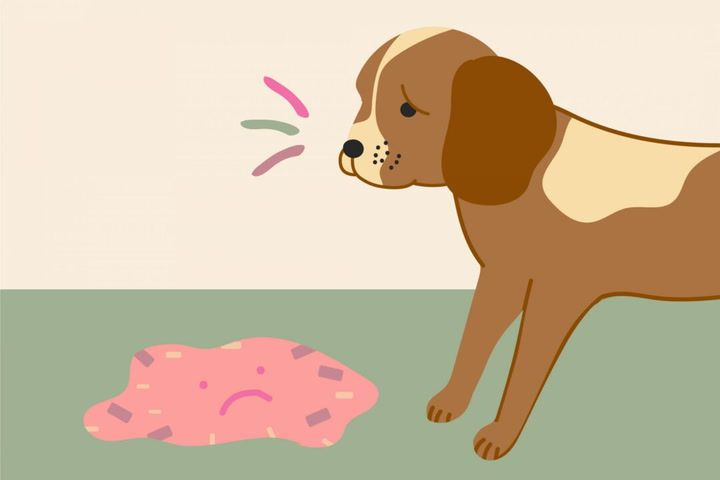Bringing a new puppy into your home is an exciting and joyous occasion. However, when your furry friend starts exhibiting signs of distress, especially vomiting, it can be concerning and perplexing. In this guide, we'll delve into the various reasons your puppy might be throwing up and how to address each issue effectively.

Normal Puppy Behavior
So, your little furball has decided to showcase their culinary adventurous side by tossing up their latest meal. Before you hit the panic button, let’s talk about normal puppy behavior.
Puppies are Explorers
Puppies are like tiny, fluffy scientists. They explore the world with their noses, mouths, and sometimes, their stomachs. It's not uncommon for them to taste-test random objects, which can occasionally lead to an upset tummy and, you guessed it, some not-so-pleasant expulsions.
Learning Through Mouth
Just like babies learn about the world by putting everything in their mouths, puppies do the same. This learning strategy can sometimes result in ingesting things that don't quite agree with their stomachs, causing a bout of vomiting.

When to Worry
Now, don't get us wrong – vomiting isn't something to ignore completely. If it's an isolated incident and your puppy is their usual energetic self, it might just be a one-off curiosity-induced event. However, if it becomes a recurring theme or is accompanied by other worrisome symptoms, it's time to dig deeper.
Dietary Issues
Alright, let's talk about food. We've all been there – sometimes we indulge in something new, and our stomachs decide to stage a protest. Puppies are no different.
Abrupt Diet Changes
Imagine if you went from your usual salads to a sudden diet of spicy tacos and decadent desserts. Your stomach would likely stage a rebellion. Puppies can experience similar distress when their diets change abruptly. Transitioning them slowly to new foods helps avoid these digestive hiccups.
Balanced Diet Matters
Puppies, like growing kids, need a balanced diet for proper development. Ensuring they get the right mix of proteins, fats, and carbohydrates is crucial. When their delicate digestive systems get bombarded with unfamiliar foods, it can lead to vomiting.
Feeding Consistency
Consistency is key. Establishing a regular feeding schedule helps regulate their digestion. If you're switching puppy foods, do it gradually over a week or so to give their tummies time to adapt. It’s like introducing your body to a new workout routine – gradual changes are more manageable.
Parasites and Infections
Now, onto the slightly ickier topics – parasites and infections. It might not be pleasant to think about, but understanding these possibilities is crucial for your pup's well-being.
Tiny Tummy Invaders
Puppies, being low to the ground and curious, can easily pick up parasites like worms. These uninvited guests irritate the stomach lining, leading to vomiting. Regular vet check-ups and deworming treatments are your frontline defense against these microscopic invaders.
Infections on the Sneak Attack
Infections can also be the culprit behind your puppy's upset stomach. Just like humans, they can catch bugs that mess with their digestive systems. Vaccinations and keeping their environment clean help reduce the risk of these invisible troublemakers.
When to Call the Vet
While the occasional vomit may not send you into panic mode, persistent vomiting, lethargy, or any other alarming symptoms should trigger a vet visit. Early detection is your best friend when it comes to tackling parasites and infections.
Toxic Ingestion
Picture this: your puppy, with their insatiable curiosity, decides to turn your living room into a buffet. While it's amusing to watch their adventurous spirit, it’s crucial to be aware of potential toxic items in your home.
Puppy Buffet Hazards
Puppies explore the world through their mouths, and unfortunately, that includes tasting things they shouldn’t. Common household items like certain plants, human foods, or even cleaning products can be toxic to our furry friends.
Puppy-Proofing 101
Consider this your cue to puppy-proof your living space. Keep hazardous items out of reach, secure trash cans, and be mindful of what's within your puppy's investigative reach. It’s a bit like baby-proofing your home, but for your four-legged family member.
When in Doubt, Vet It Out
If you suspect your puppy has ingested something harmful, don't play the waiting game. Contact your vet immediately. Time is of the essence when it comes to potential toxic ingestion, and a quick response can make all the difference.
Motion Sickness
Now, let's talk about puppy car rides – a potentially vomit-inducing experience for some. Motion sickness in puppies is a real thing, and understanding it can make travel much smoother for both you and your furball.

Riding Rollercoasters in the Car
Puppies, like some humans, can get motion sickness during car rides. The combination of excitement, unfamiliar motion, and perhaps a bit too much window-gazing can lead to an upset stomach and, well, you know the rest.
Take It Slow
If your puppy is a first-time traveler, ease them into the experience. Start with short rides, gradually increasing the duration. Make it a positive experience by giving treats and praise, turning the car into a place of fun rather than fear.
Comfort is Key
Ensure your pup travels comfortably. Use a secure crate or a pet seat belt, and avoid feeding them right before the journey. A stressed-out or overfed pup is more likely to experience motion sickness.
Overeating
Puppies and enthusiastic eating often go hand in paw. While it's adorable to see them devour their meals with gusto, overeating can lead to some less-than-adorable consequences.
Binge-Watching for Puppies
Puppies, like us binge-watching our favorite shows, can sometimes overdo it at the food bowl. Overeating can result in an upset stomach, and in extreme cases, it might end in a display of the puppy's not-so-culinary prowess.
Portion Control is Puppy Love
Establishing a feeding routine with controlled portion sizes is crucial. It might be tempting to give in to those puppy eyes, but resisting the urge to overfeed ensures your pup's digestive system stays happy.
Slow and Steady Wins the Mealtime Race
Consider using slow feeder bowls to prevent rapid eating. This not only aids in digestion but also turns mealtime into an engaging puzzle-solving activity for your clever canine.
Allergies
Ah, allergies – not just a human woe. Turns out, our four-legged companions can also be victims of the occasional sneeze fest or, in this case, an upset stomach.
The Itchy, Scratchy Side of Allergies
Just like us, puppies can develop allergies. It might not manifest as a runny nose or itchy eyes; instead, it might show up as vomiting. Common allergens include certain foods, pollen, or even the laundry detergent you use for their favorite blanket.
Playing Detective
Identifying the specific allergen can feel like searching for a needle in a haystack. Your best bet? Consult your vet. They can guide you through allergy tests and help you figure out what's triggering your pup's tummy troubles.
Adjusting the Menu
Once you've identified the culprit, it's time for a menu makeover. Switching to a hypoallergenic or allergen-specific diet might be the key to keeping your pup's stomach settled.
Stress and Anxiety
Puppies, just like people, experience stress and anxiety. And, just like in humans, these emotions can wreak havoc on their digestive systems.
The Worrying World of Puppies
New environments, separation from their littermates, or even changes in routine can stress out your furry friend. Unlike us, they can't express their feelings with words, so they resort to non-verbal cues, like vomiting.
Creating a Stress-Free Haven
To keep their stomachs and hearts happy, create a stress-free haven at home. Provide a comfortable space, introduce new experiences gradually, and shower them with love. A calm environment can make all the difference.
When to Play the Vet Card
If your pup's anxiety seems persistent or severe, don't hesitate to seek professional advice. Your vet can recommend strategies, from behavioral techniques to medications, to help your pup find their zen.
Common Breeds Susceptible to Vomiting
Now, let’s dive into the world of genetics. Believe it or not, some breeds are more prone to stomach troubles than others. Knowing your pup's breed specifics can be a game-changer in managing their health.

The Sensitive Stomachs Club
Certain breeds are known for having more delicate digestive systems. Bulldogs, Boxers, and Dachshunds, for instance, might be more prone to vomiting. Understanding these breed-specific quirks allows you to tailor their care accordingly.
Tailored Care Tips
Once you've identified your pup's breed tendencies, you can take proactive steps. Adjust their diet, be mindful of potential triggers, and consider more frequent vet check-ups to catch issues early.
Pampering Your Pooch
It's not about singling out breeds; it's about understanding their unique needs. Whether your pup is a member of the sensitive stomach club or not, a little extra pampering and awareness can go a long way in keeping those stomach issues at bay.
When to Seek Veterinary Attention
Now that we've covered the ins and outs of why your puppy might be throwing up, let's talk about when it's time to bring in the big guns – the veterinary superheroes.
Trust Your Instincts
First and foremost, trust your instincts. If something feels off, it probably is. While the occasional vomit might not be cause for panic, persistent vomiting, lethargy, or any behavior that deviates from your pup's norm is a red flag.
Persistent Puking Party? Vet Time.
If your puppy is turning every meal into a regurgitation ritual, it's time to dial your vet's number. Vomiting accompanied by diarrhea, dehydration, or any signs of distress warrants immediate attention.
Timely Vet Visits Save Tails
Remember, it's always better to be safe than sorry. Veterinary attention isn't just for emergencies; it's also a preventive measure. Regular check-ups can catch potential issues before they become full-blown problems.
Home Remedies
Alright, let's get into the nitty-gritty of at-home solutions for those less serious puppy pukes. Before you dive into the medicine cabinet, though, remember: if in doubt, vet it out.
Bland Diet to the Rescue
If your pup's stomach seems to be in protest mode, consider giving them a break from the usual grub. Boiled chicken and rice are gentle on their tummies and can help ease the digestive discomfort.
Hydration Station
Just like us, staying hydrated is crucial for a quick recovery. Ensure your pup has access to clean water. If they're reluctant to drink, try ice cubes or a little low-sodium broth to entice them.
Rest and Relaxation
Sometimes, all your pup needs is a little R&R. Let them chill in their favorite spot, away from potential stressors. A cozy blanket and some gentle pets might be the remedy.
Preventive Measures
Now, let’s talk about being proactive. After all, prevention is the best medicine, right?
Regular Vet Check-Ups: Not Just for Humans
Scheduled vet check-ups aren't just a formality – they're your puppy's VIP pass to a healthy life. Regular vaccinations, deworming, and overall health assessments can catch potential issues early on.
Vaccination Nation
Speaking of vaccinations, they're like superhero shields for your pup. They protect against nasty bugs that can wreak havoc on their immune systems and digestive tracts.
Diet Detective Work
Take a closer look at what's fueling your furry friend. Ensure their diet is balanced, high-quality, and suits their specific needs. Your vet can help tailor a nutrition plan fit for a canine king or queen.
Create a Stress-Free Haven
Stress and anxiety are not just vomit-inducing; they can lead to a myriad of health issues. Create a stress-free haven at home, full of love, comfort, and maybe a few extra belly rubs.
Stay Informed, Stay Ahead
Stay informed about common puppy health issues and educate yourself about your pup's breed specifics. The more you know, the better equipped you are to provide the best care.

Conclusion
Understanding why your puppy is throwing up is crucial for providing the best care. While occasional vomiting may be normal, being vigilant about your puppy's health, addressing potential triggers, and seeking veterinary attention when needed are vital steps in ensuring a happy and healthy life for your furry friend.
FAQs
- Q1: Is occasional vomiting normal in puppies?
- Yes, occasional vomiting can be normal as puppies explore the world around them.
- Q2: How can I puppy-proof my home?
- Keep harmful items out of reach, secure trash cans, and be mindful of plants and foods that can be toxic.
- Q3: When should I be concerned about my puppy's vomiting?
- Persistent vomiting, lethargy, and other concerning symptoms warrant a prompt visit to the vet.
- Q4: Can stress cause vomiting in puppies?
- Yes, stress and anxiety can impact a puppy's digestive health, so it's important to create a calm environment.
- Q5: What are some home remedies for mild cases of vomiting?
- Consult with your vet, but bland diets, hydration, and rest are often recommended.




